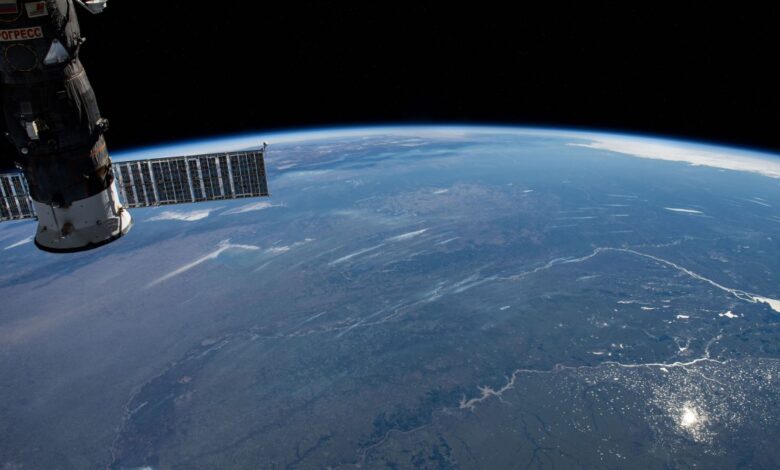“Overview effect” is a big reason to speed up space exploration

At the recent Space Renaissance Festival held in Berlin, I attended a talk by Michael Waltemathe from the Ruhr University in Bochum, Germany on the so-called “overview effect,” a term coined by author Frank White in his 1987 book of the same name. Science writer Jeffrey Kluger has described this effect as “the change that occurs when [astronauts] see the world from above, as a place where borders are invisible, where racial, religious, and economic strife are nowhere to be seen.”
A life-changing experience
That feeling has been experienced by many travelers to space, regardless of gender, ethnicity, or nationality. After spending 20 days in orbit, Russian cosmonaut Oleg Makarov reported, “Something about the unexpectedness of this sight, its incompatibility with anything we have ever experienced on Earth elicits a deep emotional response… Suddenly, you get a feeling you’ve never had before… That you’re an inhabitant… of the Earth.”
Edgar Mitchell, who walked on the Moon during the Apollo 14 mission in 1971, described it this way:
“You develop an instant global consciousness, a people orientation, an intense dissatisfaction with the state of the world, and a compulsion to do something about it. From out there on the Moon, international politics looks so petty. You want to grab a politician by the scruff of the neck and drag him a quarter of a million miles out and say: Look at that, you son of a bitch.”
Not everyone is likely to feel the same way as Makarov or Mitchell. But the overview effect has been experienced by many professional and non-professional space travelers, including the American-Iranian multimillionaire Anousheh Ansari, who described her experience as life-changing. Given the current state of affairs on our planet, we clearly could benefit from more people gaining this perspective.
Is our enthusiasm lost in space?
At the same time, space exploration, especially human space exploration, seems to have slowed down — or at least become less ambitious — over the past couple of decades. Yes, there are still triumphs like the recent launch of the James Webb Space Telescope. But in the nearly half-century since the Viking mission, there hasn’t been a single spacecraft sent to Mars or any other planetary body explicitly devoted to detecting life.
For the cost of the Iraq War, we could already have a station on Mars with 10-12 inhabitants.
New missions to Venus and the outer Solar System are on the drawing board, but all too often these plans get delayed or even cancelled. I was on the preliminary science definition team for a planned mission to Europa about 20 years ago. During our discussions, we concluded that a basketball-sized lander to analyze the Europan ice for remnants of organic compounds and possibly life should be included in the mission. A Europa lander remains stuck in the conceptual stage.
In the 1980s, plans for a lunar outpost never materialized. Instead, we launched space shuttles and built the International Space Station (ISS). While the ISS did maintain a presence in Earth orbit, it did not fulfill early hopes of propelling us to become a space-faring society (which may only now start to happen due to the initiative of private space companies).
Interest in a human mission to Mars has rekindled after a long hiatus. But even that effort seems stalled. When I attended NASA’s First Mars Human Landing Site Workshop in Houston in 2015, the first astronauts were expected to arrive on the Red Planet in the mid-2030s. Current NASA estimates are way less optimistic, although SpaceX still talks about that as a realistic timeline.
Even projects we might consider much more pressing have gotten bogged down. The survival of our species may depend on our ability to detect threatening asteroids, yet progress on this front has been slow. While more asteroids are detectable today than 20 or 30 years ago thanks to programs like the Near Earth Object Observation Program, we are still not doing everything we can to reduce that risk or any other existential risks to our planet. Nor have we prepared for how to react if and when we detect intelligent extraterrestrial life.
The tangible benefits of space exploration
Space exploration is certainly expensive, but it has brought us many new inventions used in daily life. LEDs, asphalt roofing shingles, water filters, smoke detectors, and freeze-dry technology are only a few examples. And “expensive” is a relative term. In a conversation I once had with my colleague and friend, the late Rob Bowman from New Mexico Tech, he mentioned that for the cost of the Iraq War, we could already have a station on Mars with 10-12 inhabitants.
Another colleague, Ed Guinan from Villanova University, used to do a lot of work in the developing countries of Africa. He once told me that students from those countries want to be inspired, to be part of the global community that reaches for the stars. Astronomy programs have now started in many African countries like South Africa, Nigeria, Rwanda, Uganda, Kenya, Ethiopia, and several others. Space always triggers humanity’s dreams and aspirations. Personally, I like that about our species. Exploration is in our blood, and it brings out the good in us.
No doubt, there are many other problems on our planet to resolve — more every day, it seems. But the overview effect gives us perhaps the most important perspective of all. We are living on a fragile planet with a thin veneer, our atmosphere, as our only lifeline. We need to overcome our petty differences and realize our vulnerabilities. Maybe more of us need to experience, or at least fully appreciate, the overview effect.




